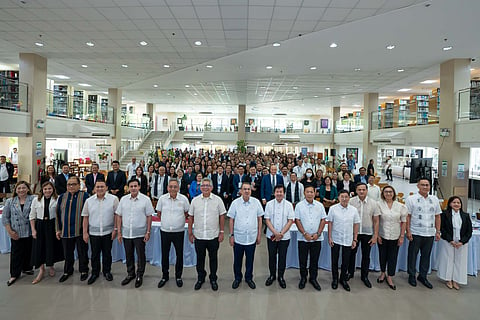
- NEWS
- the EDIT
- COMMENTARY
- BUSINESS
- LIFE
- SHOW
- ACTION
- GLOBAL GOALS
- SNAPS
- DYARYO TIRADA
- MORE

The Supreme Court is updating the Rules of Criminal Procedure for the first time in over two decades through a series of CRIMPRO Regional Consultations. The inaugural session was held on 8 August, 2024, at De La Salle Lipa (DLSL) in Lipa City, Batangas.
This initiative, led by Supreme Court Associate Justice Rodil V. Zalameda, Chairperson of the Supreme Court Sub-Committee on the Revision of the Rules of Criminal Procedure, is part of the Court’s Strategic Plan for Judicial Innovations 2022-2027 (SPJI), which aims to enhance efficiency, innovation, and access. The plan seeks to make court processes more user-friendly and comprehensible to the general public.
Chief Justice Alexander G. Gesmundo, in his remarks, underscored the need for the rules to evolve to reflect contemporary realities, ensuring they remain effective tools for delivering justice fairly, transparently, and timely to both the accused and the State. He emphasized that adapting to technology is crucial for modernizing the administration of justice.
Gesmundo further explained that the proposed amendments aim to consolidate relevant jurisprudential doctrines and procedural rules to minimize confusion. The current framework includes various specific rules, such as the Revised Guidelines for Continuous Trial of Criminal Cases, the Rule on Cybercrime Warrants, and the Rule on the Use of Body-Worn Cameras in the Execution of Warrants. The proposed revisions seek to clarify and integrate these rules into a more cohesive system.
The amendments include provisions clarifying the venue for criminal actions related to the Cybercrime Prevention Act of 2012 and guidelines allowing aggrieved parties to claim civil liability from sources other than delict, even if the accused is acquitted. The proposal also addresses the inclusion of actions pending before administrative bodies as grounds for invoking rules on prejudicial questions.
Justice Samuel H. Gaerlan highlighted that the amendments will introduce new provisions to better safeguard the rights of the accused, such as the right to bail and protection against unreasonable searches and seizures.
Furthermore, the amendments recognize that the Executive Department, through the Department of Justice (DOJ), has the authority to issue Rules on Preliminary Investigations. The DOJ has recently issued a circular updating these rules and replacing Rule 112 of the Rules of Court.
